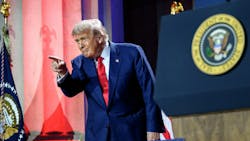Trump’s Oct. 1 pharma tariff is on hold amid pricing talks with drugmakers
President Donald Trump’s threat that starting Oct. 1 his administration would impose a 100% tariff on branded pharmaceuticals is on hold, according to multiple media outlets citing anonymous White House officials. The tariffs did not go into effect on Wednesday, as Trump had threatened last week in a Sept. 25 post on Truth Social.
The passing of the Oct. 1 deadline comes as the Trump administration continues to pressure drugmakers to lower U.S. prescription drug pricing in exchange for tariff relief. Pfizer on Tuesday announced an agreement to lower drug prices for Americans, while securing for itself a three-year grace period from pharma-specific tariffs.
At Tuesday’s White House event announcing the deal with Pfizer, Trump said his administration is “working with other major pharmaceutical companies to secure similar agreements.” Commerce Secretary Howard Lutnick said the government is letting the ongoing negotiations with these companies “play out” amid the threat of pharma tariffs.
“Tariffs is the most powerful tool to motivate behaviors, Mr. President, and clearly motivated ours,” Pfizer CEO Albert Bourla said on Tuesday at the White House. “We are ready to unleash our investment portfolio in this country, and the President graciously gave us a three-year’s grace period.”
The terms of the Pfizer agreement include a three-year grace period under which Pfizer products will not be subject to Section 232 investigation tariffs, provided the drugmaker continues to invest in U.S. manufacturing. In Tuesday’s announcement, Pfizer pledged an additional $70 billion worth of investments in U.S. research, development, and capital projects over the next few years.
Tariffs as a cudgel
Trump has been using the threat of pharma tariffs as leverage for his most- favored-nation (MFN) drug pricing policy. In late July, Trump sent letters to 17 large pharmaceutical companies demanding they get onboard with the drug pricing and warning that if they refuse his administration “will deploy every tool in our arsenal” to ensure compliance.
Bourla said on Tuesday that Pfizer’s voluntary agreement with the White House on drug pricing and tariffs was in direct response to Trump’s July 31 letter, satisfying “all four of the President’s requests” in his correspondence to the drugmaker.
Asked if other Big Pharma companies would soon be making similar drug pricing agreements, Trump said “they’re all coming in over the next week, we’re making deals with all of them.” If they don’t agree, he warned “then we’re going to tariff them.” Trump added: “we took away the advantage by the fact that we have tariffs.”
Following Tuesday’s Pfizer announcement, William Blair analysts in a note to investors said that while the majority of large biopharma companies have already announced major commitments to invest in U.S. R&D and manufacturing, they expect more drug pricing deals to “further appease the Trump administration and largely remove threats of 100% tariffs and 1,000% price reductions.”
About the Author
Greg Slabodkin
Editor in Chief
As Editor in Chief, Greg oversees all aspects of planning, managing and producing the content for Pharma Manufacturing’s print magazines, website, digital products, and in-person events, as well as the daily operations of its editorial team.
For more than 20 years, Greg has covered the healthcare, life sciences, and medical device industries for several trade publications. He is the recipient of a Post-Newsweek Business Information Editorial Excellence Award for his news reporting and a Gold Award for Best Case Study from the American Society of Healthcare Publication Editors. In addition, Greg is a Healthcare Fellow from the Society for Advancing Business Editing and Writing.
When not covering the pharma manufacturing industry, he is an avid Buffalo Bills football fan, likes to kayak and plays guitar.
